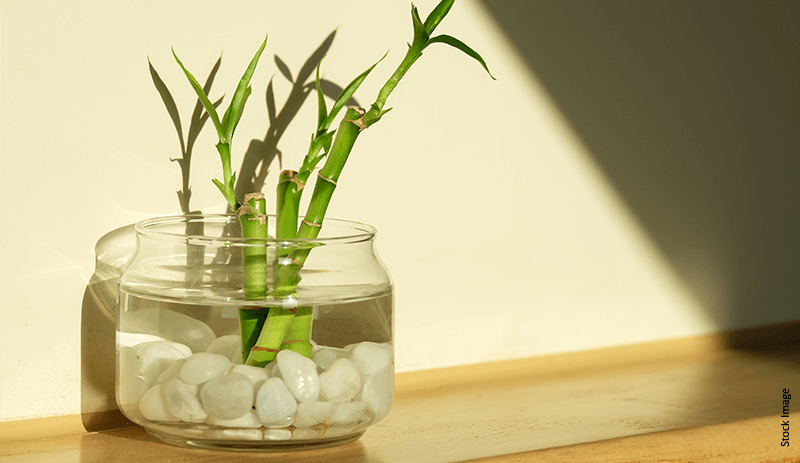17 April, 2023
4 mins read

Plants breathe air into the environment. They generate oxygen to sustain life, create an ecosystem for microorganisms, and are essential to the water cycle. With rising air pollution, more and more people are adding plants to their homes. Whether through vertical gardens, potted plants, or terrace lawns, it is important to have a small green cover at home. Feng Shui is an ancient Chinese traditional practice that emphasises arranging objects in the environment to optimise the flow of energy, or "chi." Feng Shui plants can add positive energy to the home. However, knowing about the right Feng Shui plants for home is important. Find out more.
The Feng Shui money tree, or Pachira Aquatica, is a popular plant believed to attract wealth and abundance. Placing the plant at home can enhance the flow of chi in the space and help to attract financial prosperity. The plant is also considered lucky.
Bamboo, or Bambusoideae, is a strong, resilient, and versatile plant that can help to create a sense of calm and tranquillity. The plant is not only considered a powerful symbol in Feng Shui. Bamboo is also a Vastu plant and has been used extensively in Indian homes since ancient times. The plant can create a sense of balance and harmony in the environment.
Tulsi, Holy Basil, or Ocimum tenuiflorum, is revered in Hinduism and many other cultures and is considered a lucky plant to keep at home. Tulsi is also known to heal wounds and contains anti-microbial properties. The plant holds equal importance and relevance in Feng Shui and is believed to bring harmony, prosperity, and peace to the surroundings.
The snake plant, or Dracaena trifasciata, is one of the best indoor plants. Also commonly referred to as the mother-in-law's tongue, the snake plant is a natural air purifier and can be one of the plants in the bedroom suitably placed next to the bed. The plant purifies the air and helps in relieving headaches and curing allergies. It can also enhance sleep. The snake plant is extremely easy to maintain. It needs very little water and sunlight and can be the perfect plant for people with busy schedules who may not have the time to care for a plant.
Peace lily, or Spathiphyllum wallisii, is a beautiful flowering plant that, as the name suggests, brings peace and tranquillity to the space. In Feng Shui, the peace lily is believed to have healing properties and is often used in spaces where people are recovering from an illness or injury. The peace lily is also associated with the Yin energy and helps to create a sense of balance and harmony at home. It can be one of the plants in the living room that seamlessly merges into any décor while bringing positive vibrations to the home.
The parlour palm is one of the wide varieties of palm. Known as Chamaedorea elegans, the palm is a beautiful and lustrous plant that can be placed in any corner of the house to add a dash of green. The parlour palm is an air purifier and can improve the physical and mental health of the inhabitants. It is also considered to bring wealth and prosperity. The parlour palm is a versatile plant that goes well indoors and outdoors on terraces, patios, and balconies.
This small indoor Feng Shui tree represents abundance and growth, just like its shape. Ficus elastic, or the rubber plant, is also a natural air purifier and can be ideal for houses in metro cities grappling with air pollution. Moreover, the plant is thought to bring luck, thus keeping one in the home office or study can be beneficial.
According to Feng Shui, the Jade plant, or Crassula ovata, is one of those plants that bring money and good luck. It is a symbol of fortune and blessings and is often gifted when someone starts a new venture. Moreover, in some parts of the world, this plant has medicinal benefits that help treat wounds and cure indigestion. The jade plant is a type of succulent and requires little water. But it does need sufficient sunlight, so it must be placed near a window.
There are several other lucky plants for home, according to Feng Shui. However, the ones mentioned above are the most readily available in India and adjust well in most climates. Bringing these plants home can help enhance positivity in the house and create a beautiful and harmonious environment that promotes health, prosperity, and happiness.
Disclaimer- This article is based on the information publicly available for general use as well as reference links mentioned herein. We do not claim any responsibility regarding the genuineness of the same. The information provided herein does not, and is not intended to, constitute legal advice; instead, it is for general informational purposes only. We expressly disclaim any liability, which may arise due to any decision taken by any person/s basis the article hereof. Readers should obtain separate advice with respect to any particular information provided herein.
 Table of Contents
Table of Contents04 August, 2023
29 March, 2022
29 March, 2022